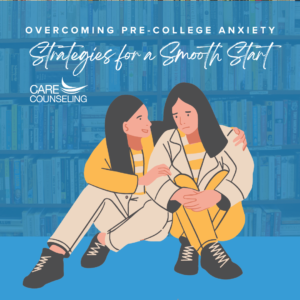Overcoming Pre-College Anxiety
 The transition from high school to college is a significant milestone that brings with it a mixture of excitement, anticipation, and, often, a touch of anxiety. Pre-college anxiety is a common experience that stems from the unknowns and changes that lie ahead. However, with the right strategies, you can ease your worries and embark on your college journey with confidence.
The transition from high school to college is a significant milestone that brings with it a mixture of excitement, anticipation, and, often, a touch of anxiety. Pre-college anxiety is a common experience that stems from the unknowns and changes that lie ahead. However, with the right strategies, you can ease your worries and embark on your college journey with confidence.
Acknowledge Your Feelings
First and foremost, it’s crucial to acknowledge and accept your feelings of anxiety. Feeling nervous or uncertain about starting college is normal, and many incoming freshmen share these sentiments. By recognizing your emotions, you’re taking a positive step toward addressing them and finding ways to manage them effectively.
- Gather Information
One of the sources of pre-college anxiety is the fear of the unknown. You can alleviate this anxiety by gathering as much information as possible about your new college environment. Research your campus, dorm life, academic programs, and available resources. Familiarizing yourself with the campus layout and learning about student services can help create a sense of familiarity.
- Connect with Future Classmates
Social connections play a crucial role in easing anxiety. Many colleges provide online platforms or social media groups where incoming students can connect with their future classmates. Engaging in conversations, asking questions, and forming early friendships can help you feel less alone in your pre-college journey.
- Visit the Campus
If possible, consider visiting the campus before your official move-in day. Walking around the campus, locating key buildings, and envisioning your life there can make the transition feel more manageable. Exploring the surroundings and nearby amenities can also help you feel more at ease.
- Attend Orientation
Orientation programs are designed to ease the transition for incoming students. They offer opportunities to learn about campus resources, meet fellow students, and familiarize yourself with college life. Attending orientation can help alleviate pre-college anxiety by providing you with a clearer picture of what to expect.
- Break Tasks into Smaller Steps
The thought of packing up your life and moving to a new place can be overwhelming. Break down the tasks into smaller, manageable steps. Create a checklist for packing, organizing paperwork, and preparing for your new adventure. Tackling tasks one by one can reduce stress and help you stay organized.
- Practice Self-Care
Prioritize self-care in the weeks leading up to college. Engage in activities that bring you joy and relaxation, such as reading, exercise, spending time with loved ones, or practicing mindfulness. Self-care helps manage stress and keeps your mental and emotional well-being in check.
- Visualize Success
Visualization is a powerful technique for reducing anxiety. Take a few moments each day to visualize yourself thriving in your college environment. Imagine yourself making friends, acing your classes, and navigating campus with ease. Positive visualization can help shift your focus from potential challenges to opportunities for growth.
- Reach Out for Support
If your pre-college anxiety becomes overwhelming, don’t hesitate to seek support. Talk to your friends, family, or a trusted mentor about your feelings. Sometimes, verbalizing your worries can provide relief, and others may offer valuable insights and encouragement.
- Set Realistic Expectations
It’s important to have realistic expectations about your college experience. Understand that not every moment will be perfect, and challenges are part of the journey. Focus on growth and learning rather than aiming for perfection.
- Remind Yourself of Past Achievements
Reflect on your past achievements and successes. Think about times when you faced uncertainty and managed to overcome challenges. Reminding yourself of your resilience and capabilities can boost your confidence as you approach the college transition.
Pre-college anxiety is a normal reaction to the significant life changes associated with starting college. By acknowledging your feelings, gathering information, connecting with future classmates, and practicing self-care, you can navigate this period of uncertainty with greater ease. Remember that starting college is an exciting opportunity for growth and learning, and the challenges you face along the way will contribute to your personal development. With these strategies in your toolkit, you’ll be well-equipped to embark on your higher education journey with confidence and enthusiasm.



























